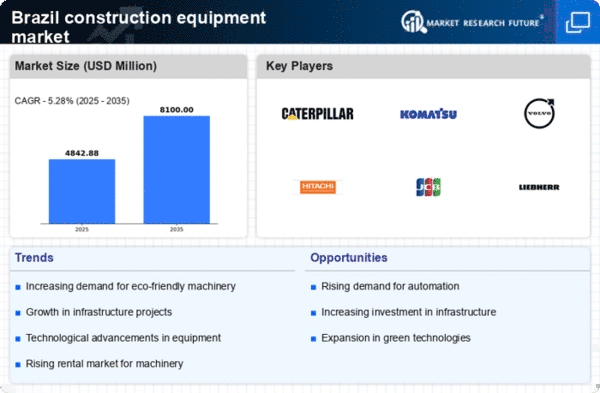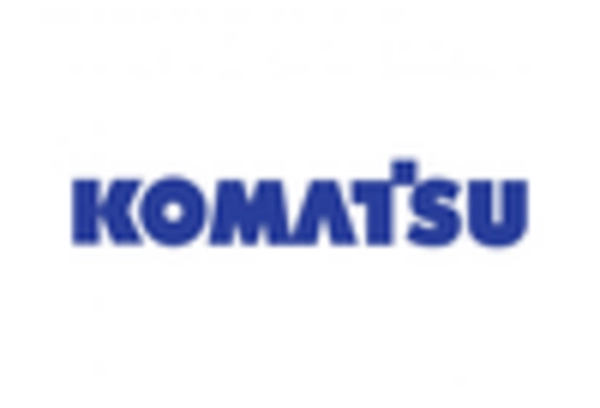Rising Urbanization
The rapid urbanization in Brazil is a pivotal driver for the construction equipment market. As cities expand, the demand for residential and commercial infrastructure surges. According to recent data, urban areas in Brazil are projected to grow by approximately 2.5% annually, necessitating increased construction activities. This growth compels construction companies to invest in advanced machinery to meet the rising demand for efficient and timely project completion. This trend is likely to benefit the construction equipment market as companies seek to enhance productivity. They aim to reduce labor costs through mechanization. Furthermore, urbanization often leads to the development of transportation networks, which further stimulates the need for heavy machinery. Consequently, the construction equipment market is positioned to experience significant growth as urbanization continues to reshape Brazil's landscape.
Environmental Regulations
The implementation of stringent environmental regulations in Brazil is influencing the construction equipment market. As the government enforces policies aimed at reducing emissions and promoting sustainable practices, construction companies are compelled to adopt eco-friendly machinery. This shift is likely to drive demand for equipment that meets new environmental standards, such as low-emission engines and energy-efficient models. According to recent studies, the market for green construction equipment is expected to grow by 20% over the next five years. This trend indicates a significant opportunity for manufacturers to innovate and develop equipment that aligns with regulatory requirements. Consequently, The construction equipment market is expected to evolve with a greater emphasis on sustainability and compliance with environmental standards.
Technological Integration
The integration of advanced technologies in construction processes is transforming the construction equipment market in Brazil. Innovations such as telematics, automation, and artificial intelligence are enhancing operational efficiency and safety on construction sites. For instance, the adoption of telematics systems allows for real-time monitoring of equipment performance, leading to reduced downtime and maintenance costs. As Brazilian construction companies increasingly recognize the benefits of these technologies, the demand for technologically advanced equipment is likely to rise. This trend may result in a shift towards electric and hybrid machinery, aligning with global sustainability goals. Consequently, the construction equipment market is expected to evolve, with manufacturers focusing on developing smart equipment that meets the changing needs of the industry.
Increased Foreign Investment
Foreign investment in Brazil's construction sector is a significant driver for the construction equipment market. As international companies seek to capitalize on Brazil's growing infrastructure needs, they are likely to invest in local construction projects. This influx of capital not only boosts project funding but also increases the demand for construction equipment. Recent reports indicate that foreign direct investment in Brazil's construction sector has risen by approximately 15% over the past year. This trend suggests that foreign investors are recognizing the potential for growth in the construction equipment market. As these companies enter the market, they often bring advanced technologies and practices, further stimulating demand for modern construction machinery. The construction equipment market is poised to benefit from this wave of foreign investment, as it drives innovation and competition within the sector.
Infrastructure Development Programs
Brazil's government has initiated various infrastructure development programs aimed at enhancing transportation and public services. These programs are expected to inject substantial investments into the construction sector, thereby driving the construction equipment market. For instance, the National Logistics Plan outlines investments exceeding $30 billion in road and rail infrastructure over the next decade. Such initiatives create a robust demand for construction equipment, as contractors require advanced machinery to execute large-scale projects efficiently. The construction equipment market is likely to see increased sales of heavy machinery, such as excavators and bulldozers, as companies respond to the growing need for infrastructure improvements. Additionally, these programs may lead to public-private partnerships, further stimulating market growth as private entities invest in construction equipment to fulfill government contracts.

















